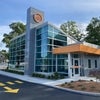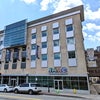The battle to control Westborough Bank
Activist investor's offer slows merger between Westborough and Hudson Savings
Westborough Bank and Hudson Savings Bank's $20.7 million merger deal seemed fairly straightforward when it was announced in November 2006.
The deal called for no layoffs or branch closings. It would allow two community banks to combine to create a larger and stronger bank.
Good for employees, but not necessarily good for investors, including one activist investor based in Toronto who has gummed up the deal.
Now, some five months later, the merger – which called for Hudson Savings Bank's parent company, Assabet Valley Corp., to buy up the publicly held shares of Westborough Bank not owned by its mutual holding company, Westborough Bancorp – is languishing as the Westborough board negotiates with Marc J. Bistricer, a Toronto-based shareholder who swooped in with a counter offer.
The status of the Westborough Bank-Hudson Savings deal is a painful reminder of the risks banks run when even just a portion – in Westborough's case just 36 percent – of its shares are held in the public market.
No control
The situation has definitely caught the eye of local bankers, including Charles Valade, president and CEO of Commonwealth National Bank of Worcester.
"I think it's something that can happen to any bank that has publicly-owned stock," said Valade, adding that "when you're a public company, you can't control who buys your stock."
CNB's holding company is publicly-owned and Valade understands the vagaries of far-flung shareholders. If an outside investor began buying blocks of shares, Valade wouldn't necessarily know until the buyer hit a threshold of 5 percent of the stock. That's when Securities and Exchange Commission rules require disclosure.
There isn't any such investor in CNB – but if that does occur, "you really want to make a phone call and have some frank discussions," Valade said.
Whether such "frank discussions" were had between Bistricer and Westborough Bank's President Joseph MacDonough is not known. MacDonough did not return calls seeking comment for this article.
But what is known is that Bistricer, who claims to own 9 percent of Westborough's outstanding shares, is unhappy with Hudson Savings' offer.
In letters to the Westborough Bank board that he made public, Bistricer has been forthcoming with criticism of the proposed merger, calling the $35 per share price that Hudson Savings has offered for the public shares of Westborough Bank "inadequate" and arguing that the sale is more about guaranteeing employment for Wesborough management than about shareholder value. Bistricer first offered $40 per share to counter the Hudson Savings offer. After that was shot down by the board, he upped his price to $41 per share.
The second offer was also rejected with the board saying it had "concerns" about the likelihood of Bistricer obtaining regulatory approval for his offer and that his offer showed a "lack of any benefits to Westborough's depositors, customers and community."
Mystery man
Little information is available on Bistricer. When reached by phone for this article he declined to answer questions about his background, and only said that his interest in Westborough Bank is ongoing and that he had met with the board of directors on April 30. He referred all other questions to go through his New Jersey-based spokesperson, Keith Zakheim.
Zakheim confirmed that Bistricer's offer was "still alive and well," and said that he is waiting to hear back from the Westborough Bank board.
Bistricer is part of a family-run real estate business based in Toronto called Talisker Corp., according to Zakheim. According to various newspaper articles, Talisker has numerous high-end real estate projects in the works, including a 900-unit condo project in Park City, Utah. A call to the Toronto Star, Bistricer's hometown paper, revealed little more information on the man. A business reporter at the Star did a search of the paper's archives for Bistricer and came up empty.
Bistricer's initial offer of $40 per share was actually the second unsolicited offer Westborough Bank received since the merger plan was announced. Another party – who has not gone public – also offered $38.50, but that offer was also rejected by the Westborough Board.
Despite the delays, Mark O'Connell, president and CEO of Hudson Savings, said the deal is "progressing" and that he hopes the merger can be closed by the middle or end of June.
"I don't see any reason to believe that we won't get to the finish line," O'Connell said. "It just might take us a little longer than we originally thought."
And as for Bistricer, O'Connell said that he did not know "where his interests lie."
There's also a chance that Westborough and Bistricer might end up in court, which would no doubt delay the Hudson Savings deal much longer. As of the deadline for this article no suit had been filed, but Bistricer has left the door open, saying in a letter to the board that he is "currently evaluating all commercial, legal and administrative options."
"We're hoping that isn't going to happen," O'Connell said.
Pandora's Box
Westborough Bank has about $300 million in assets and three branches – in Westborough, Northborough and Shrewsbury. Hudson Savings' assets total about $655 million, while it has four branches in Hudson, Marlborough, Clinton and Leominster.
Westborough formed its mutual holding company and issued public shares in 2000. Since that time, the bank has been seeking ways to grow, but during the first quarter of 2007 reported a net loss of $515,000, compared with a profit of $198,000 for the same period in 2006. The bank said that the loss was primarily due to the inverted yield curve, which has resulted in short term yields outpacing long term yields, causing headaches for bankers throughout the region. Costs associated with the proposed merger also contributed to the loss, according to the bank.
According to filings by Westborough Financial Services, the holding company for the bank, with the SEC, the Westborough board of directors considered a variety of alternatives leading up to the merger plan with Hudson Savings. Those alternatives included a "second-step conversion," making the bank 100 percent publicly-owned, but that was ruled out as being too costly in the end. The board also considered taking the bank private in order to avoid the regulations imposed upon publicly traded companies – but that, too, was dismissed.
In the end, the board decided its best chance for increasing shareholder value was pursuing a merger, which calls for the mutual holding company to be eliminated and Westborough Bank merging with and into Hudson Savings Bank. The new entity would have a new name, but that has not yet been disclosed.
According to the SEC filings, six different merger candidates – including Hudson Savings – were identified.
"I personally think it's a good deal," Valade said of the Westborough-Hudson Savings merger. "And I think we'll see a lot more mergers like that with the stresses and pressures being put on banks today."
But it's likely to be a long hard road for Westborough and Hudson Savings, according to Stanley Ragalevsky, an attorney with the Boston law firm of K&L Gates, who has been observing the saga from the sidelines. Ragalevsky is critical of partial stock conversions for banks because it opens an institution to investors driven solely by greed.
"I don't think this is just going to go away," he said. "I'm anticipating a lawsuit in this matter."









0 Comments